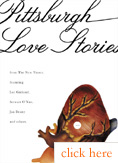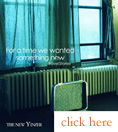February 16, 2005
Remembrance of Pierogies Past
by Jonathan Ritz
While local headlines lament the exodus of young people from Pittsburgh, I have anecdotal evidence of an offsetting trend: a good number of our 20-something émigrés return as 30-somethings. I’m a good example — Pitt graduate in ‘92, gone for a decade for grad school and other adventures, now back — and every weekend it seems I meet another one of the recently returned, most of us drawn back to be near family, buy an affordable first house, and perhaps relive some portion of our modestly misspent youth.
Thomas Wolfe’s famous dictum notwithstanding, returning to the scene of one’s salad days can be a heartening experience, though also an oddly unsettling on — all those memories of the past superimposed on the present, all the weighing of who-I-was against who-I-am, all the self-satisfaction and regret. Upon my return I took a quick spin around the city and discovered that many of my favorite former haunts are now history. Graffiti, Zelda’s, The Electric Banana, the Decade — all gone-daddy-gone. It made me feel out of touch and kind of old. Had all those clubs gotten married and moved to the suburbs?
Then, flipping through the pages of the City Paper (no longer In Pittsburgh), I saw a blessedly familiar name: The Bloomfield Bridge Tavern was still alive, kicking, and open for business. A decade ago my college roommate turned me on to the BBT, promising me “the best Polish food and punk music in Pittsburgh.” As an all-in-one bar/restaurant/club, it accommodated all three portions of one our evenings out: a cheap, carbo-loading dinner to fortify for the night’s debauchery; cold beer and an amiable, unpretentious atmosphere to drink in; loud live music from the best, and usually lesser-known, local bands.
So it was with nostalgia and a hearty appetite that I returned there on a recent Saturday evening, alone, for dinner. Tucked under the southern end of its namesake, the BBT looks from a certain angle to be part of that structure itself (perhaps that explains its longevity — any tavern that’s part bridge is going to be around awhile). I parked in the convenient adjacent lot, admiring the Polish family crests painted on the sidewalk, then walked in and took a seat at a wobbly card table, the kind you can pick up for a smile at a yard sale. Right away my first hope for the evening’s dining experience had been met: The BBT was essentially the same place it had been 10 years ago.
Almost immediately a young woman in a red Budweiser halter-top was upon me. She sat a laminated menu on the table. “I’m Amy,” she said, “and I’ll be taking care of you tonight.” A thin bra strap had slipped slightly of her shoulder, a small but heartbreaking detail to a single fella dining alone on a Saturday night. I didn’t have to think long about what to order: the Polish Platter, consisting of haluski (cabbage and noodles), golumpski (stuffed cabbage), kielbasa, and pierogies, along with a bottle of Iron City.
Amy swooped off with my order, and I turned to look out the window at the drizzly, darkening evening. It was typical Pittsburgh weather, old world weather, the kind that brings to mind women in Krakow heading home, hands held to their babushkas, in the rain after Mass. Inside there were several tables seated and a handful of lone men at the bar, and Amy, apparently the sole bartender/server on duty, was a model of easy efficiency, clicking her pen and scribbling orders, reaching down into the cooler for beers, running a bottle of ketchup out to a table. During a momentary break in the action she grabbed a few quick bites off a plate on the bar, then lit a long cigarette and resumed a conversation with a rotund patron sitting nearby.
The BBT was just her night job, I overheard; during the day she did payroll for the auto dealer up the street and was taking a couple classes in her spare time. She was maybe 25 and she could probably run the world if someone asked her to.
My meal came quickly. Visually Polish cuisine doesn’t offer much — the kielbasa was a small chunk of pink against a blanched bed of potato, cabbage, and noodles — but the taste didn’t disappoint. The rubbery skin of the sausage gave way to smoky, juicy meat, and the haluski and pierogies were filling, buttery but not promiscuously so. The golumski, though, was the real treat: The cabbage was pleasantly firm, the meat stuffing sweet and even a little spicy. It was everything I’d remembered, though one thing had changed: I found myself sizing up the fat content of the meal, something that wouldn’t have crossed my mind the last time I was there.
Finishing my second beer, I thought of Proust and his cup of tea, its swirling inducement into his multi-volume past. Then I zipped up my coat and headed back into the rain of my once and again hometown.
Jonathan Ritz’s essays and stories have appeared in American Literary Review, Cimarron Review, the Chicago Tribune, and have received two Pushcart Prize nominations. He lives in Pittsburgh and teaches writing at the University of Pittsburgh at Johnstown.




